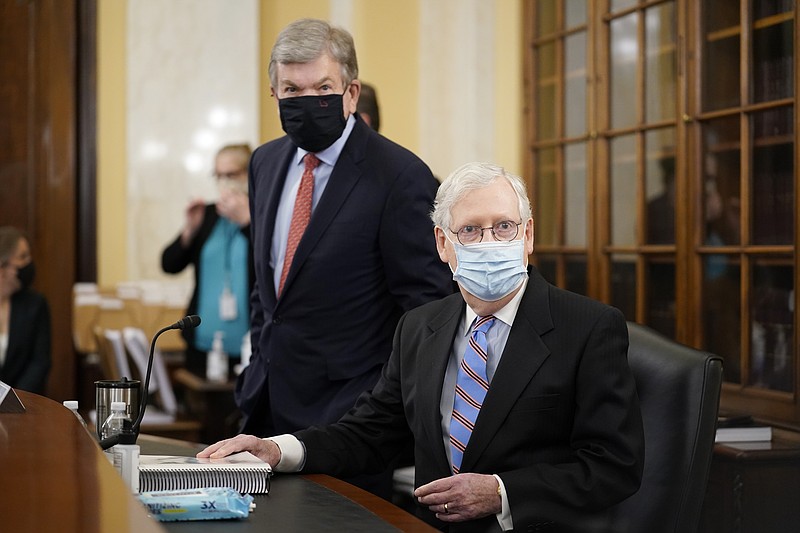WASHINGTON -- Republicans opened an all-out assault Tuesday on sweeping voting-rights legislation, forcing Democrats to take politically awkward votes spotlighting the increasingly charged national debate over access to ballots.
[Video not showing up above? Click here to watch » https://www.youtube.com/watch?v=8reVuzqFS_U]
The measure would bring about the largest overhaul of U.S. elections in a generation, touching on almost every aspect of the electoral process. Democrats say the changes are even more important now as Republican-controlled states impose new voting restrictions after the divisive 2020 election.
Yet it's a motivating issue for Republicans, too. Senate Minority Leader Mitch McConnell, R-Ky., argued against the measure in Tuesday's Rules Committee session, a rare role for a party leader that shows the extent to which Republicans are prepared to fight.
Republicans will offer scores of amendments to highlight aspects of the bill they believe are unpopular, including the creation of a public financing system for political campaigns, an overhaul of the federal agency that polices elections and dozens of provisions that would dictate how states conduct their elections.
"We'll hear a lot of flowery language today," said McConnell. "But we all learned early in life if you can write the rules, you can win the game."
The congressional effort takes place as states including Georgia, Florida, Arizona and Texas are pushing new voting rules, spurred by former President Donald Trump's claims about election fraud after his 2020 loss.
Democrats are on defense, having been unable to halt the onslaught of new state rules that will take months or years to litigate in court. That leaves passage of legislation through Congress as one of the few remaining options to counteract the GOP efforts.
"These bills moving in state capitals across America are not empty threats, they are real efforts to stop people from voting," said Sen. Amy Klobuchar, D-Minn., chairwoman of the Senate Rules Committee.
Republicans argue the new state rules are needed to clamp down on mail ballots and other methods that became popular during the pandemic, but critics warn the states are seeking to reduce voter access, particularly for Black voters.
There was no widespread fraud in the 2020 election. Trump's claims were rejected by Republican and Democratic election officials in state after state, by U.S. cybersecurity officials and by courts up to the U.S. Supreme Court. And his attorney general at the time said there was no evidence of fraud that could change the election outcome.
Senate Majority Leader Charles Schumer, D-N.Y., also spoke during the rules panel meeting to add his weight to the debate, excoriating Republicans for embracing Trump's false claims about the election.
"President Trump told a big lie, one of the biggest ever told. We all know that. every single person in this room knows that," Schumer said. "And it's taking root, this big lie is taking root in our country, not just in the minds of his voters but in the laws of the land."
President Joe Biden has said the federal bill would "restore the soul of America" by giving everyone equal access to the vote.
Known as the For the People Act, the legislation was given top billing on the Democratic agenda, but the path ahead is unclear.
Sens. Joe Manchin, D-W.Va., and Kyrsten Sinema, D-Ariz., have both said they oppose making changes to the Senate's filibuster rules, which would be needed to maneuver the bill past Republican opposition and pass it with a simple majority in a 50-50 Senate, with Vice President Kamala Harris delivering the tiebreaking 51st vote.
House resolution HR1, and its companion, SR1, in the Senate have been in the works for several years. As passed by the House in March, the legislation would create automatic voter registration nationwide, require states to offer 15 days of early voting, require more disclosure from political donors and restrict partisan gerrymandering of congressional districts, among other changes. It also would compel states to offer no-excuse absentee voting.
It would force the disclosure of donors to "dark money" political groups, which are a magnet for wealthy interests looking to influence the political process while remaining anonymous.
In the latest version of the legislation, states would have more time and flexibility to put new federal rules in place. Some election officials had complained of unrealistic timelines, increased costs and onerous requirements.
Information for this article was contributed by Jonathan Lemire of The Associated Press.





